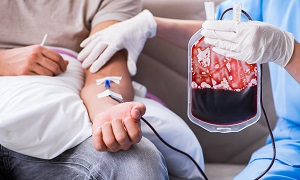Best Anemia Treatment Doctors (Hematololgists) in India
Best Anemia Treatment Hospitals in India
- City: New Delhi, India
Hospital Highlights:
- Equipped with 650 beds, BLK-Max Super Speciality Hospital is the largest stand-alone private sector hospital in Delhi.
- With over 1500 healthcare providers and 150 globally renowned super specialists, the hospital is one of Asia’s largest BMT Centres. The hospital is known for having some of the best cancer doctors in the country.
- The hospital is NABH and NABL accredited and was inaugurated by the first Prime Minister of India. Pt. Jawahar Lal Nehru.
- City: Hyderabad, India
Hospital Highlights:
- Located in the vibrant city of Hyderabad, Apollo Health City is a world-renowned medical facility that provides outstanding care and treatment to patients coming from different parts of the world.
- Founded in 1988, this 550-bed multispecialty hospital with 50 specialties and 12 Centres of Excellence continues to deliver outstanding outcomes for patients with the simplest to the most complicated medical conditions.
- Backed by the latest medical equipment and a dedicated team of professionals, the hospital provides comprehensive treatment across various specialties including, cardiology, critical care, neurosciences, cancer, orthopedics, gynecology, ENT, transplants, gastroenterology, etc.
- Apollo Health City is a cutting-edge healthcare facility that combines various facilities under one roof. These may include state-of-the-art physical medicine, rehabilitation, and wellness services with education, research, telemedicine, innovative medical devices, disease management programmes, and medical talents.
- The hospital is known for offering top-notch cancer treatment accompanied by cutting-edge facilities and technology.
- The hospital also offers a broad spectrum of cosmetic procedures that improve not just appearance but also comfort.
- In 2011, Apollo Health City was the recipient of the Asian Hospital Management Award (AHMA).
- In 2013, the Government of India recognized Apollo Health City as the top medical tourism destination in the country.
- City: Mumbai, India
Hospital Highlights:
- Kokilaben Dhirubhai Ambani Hospital, Named after the wife of Indian industrialist Dhirubhai Ambani, the founder of Reliance Industries, this is one of the top hospitals in Mumbai. This 750-bed multi-specialty hospital became operational in 2009. Known as one of India’s most advanced tertiary care facilities, the hospital is designed to raise India’s global standing as a healthcare hub, with an emphasis on excellence in clinical services.
- Kokilaben Dhirubhai Ambani Hospital uses Protocol and Care Pathway based treatment models to ensure the best outcomes for patients.
- The hospital represents a confluence of top-notch talent, cutting-edge technology, state-of-the-art infrastructure, and, most importantly commitment.
- The hospital also holds the accreditation of the NABH, NABL, CAP, and JCI.
- The hospital has been recognized as the No. 1 Multispecialty Hospital in Mumbai and the West Zone for the fifth year in a row in 2020 by The Week.
- City: Chennai, India
Hospital Highlights:
- Apollo Cancer Centre in Teynampet, Chennai is one of the best super speciality hospitals in India. It is the country’s first ISO-certified healthcare facility.
- Additionally, it is the first hospital in Chennai and the first oncology hospital in India to receive NABH accreditation.
- The hospital provides advanced tertiary care in oncology, orthopedics, neurology and neurosurgery, head and neck surgery, and reconstructive and plastic surgery.
- Additionally, it offers specialized healthcare of international standards with results comparable to those of the best hospitals in the world.
- It is outfitted with 300 beds, the newest and greatest technology, a large pool of highly qualified specialists, and a committed team of medical and paramedical professionals.
- It is one of the first few medical facilities in India to offer comprehensive cancer care. A team of skilled medical, surgical, and radiation oncologists makes up the Tumour Board, which is a component of the complete treatment planning system. After reviewing reported cases, the Board determines in concert with diagnostic specialists what course of action is best for each individual patient. The panel is further supported by dieticians, medical counselors, speech therapists, and other pertinent specialists.
- The hospital launched the first ExcelsiusGPS® Spine Robot in South India and has completed over 50 surgeries till date.
- It is also one of the few cancer hospitals in India to offer Cyber Knife therapy. Till now it has completed 1320 Cyber Knife therapies.
- The institution is also one of the few in India with the capacity to do transplants and find a prospective unrelated donor. The hospital has performed over 1000 BMTs till now.
- Furthermore, it has an exceptional milestone of performing exultant Micro vascular free tissue transfer and Aesthetic surgeries on more than 1000 patients with success.
- City: Chennai, India
Hospital Highlights:
- Apollo Hospitals, Chennai, is one of the best hospitals for heart care in India. Over the years, Apollo has expanded all over India, as a healthcare chain.
- India’s first ‘Only Pancreas’ transplant was performed in Apollo Hospital. The hospital is known for successfully performing Asia’s first en-bloc combined heart and liver transplant, and over the years, it has attained a remarkable achievement in the global healthcare space. Around 3-4 organ transplants are performed in the hospital per day.
- Equipped with over 500 beds, this hospital in Chennai was established in 1983 and since then has been among the most preferred hospital for patients from all over the world.
- The hospital holds accreditation of the NABH and JCI and is the first hospital in India to be ISO 9001 and ISO 14001 certified. It is also the first South Indian Hospital to receive subsequent reaccreditation from the JCI USA 4 times.
- City: Chennai, India
Hospital Highlights:
- Established in 1999, Gleneagles Global Hospital, Chennai, is one of the top healthcare facilities in Southern India. It is part of the Gleneagles Hospital Chain, which is the fourth largest healthcare chain in the country. The hospital specializes in multi-organ transplants of kidneys, liver, lungs, heart, etc.
- The hospital has an excellent infrastructure and state-of-the-art lab and equipment set-up. The hospital boasts cutting-edge technologies, a highly skilled team of doctors and surgeons, and trained support staff. Located in Perumbakam, Chennai, it is one of India’s premier health care destinations. The hospital has performed some of the most complex surgical and clinical procedures in India including multi-organ transplantations.
- The hospital’s lung transplantation program is one of the best in the country. The hospital is known for having performed India’s first single lung transplant and first minimal invasive lung transplant. It is also the only Indian hospital to be associated with King’s College Hospital, London, United Kingdom for liver transplantations.
- City: Hyderabad, India
Hospital Highlights:
- KIMS Hospital (a brand name of Krishna Institute of Medical Sciences) is one of the largest and best multi-speciality hospitals in Hyderabad. The hospital provides various treatments to an enormous number of patients.
- The hospital has a capacity of more than 3000 beds. KIMS Hospitals offers different healthcare services in more than 25 specialities and super specialities.
- The hospital is equipped with modern medical equipment and technology. It has robotic equipment to provide minimal invasive techniques for patients.
- The hospital is aimed at providing world-class healthcare facilities and services at an affordable cost for patients.
- The various specialities and departments of the hospital include neurosciences, gastroenterology & hepatology, robotic science, reproductive sciences, dental science, oncological sciences, organ transplantation, heart and lung transplantation and mother and child care.
- City: Kolkata, India
Hospital Highlights:
- Established in 2003, Apollo Gleneagles Hospitals is a 750-bed multispecialty tertiary care hospital situated in Kolkata.
- With 33 Centres of Excellence and more than 50 specialties, Apollo Gleneagles Hospitals, Kolkata is capable of handling all sorts of patients.
- This tertiary care hospital, which is a 100% subsidiary of Apollo Hospitals Enterprise Ltd., India, is regarded as one of Kolkata’s top hospitals.
- The facility is a complete blend of cutting-edge technology, state-of-the-art infrastructure, and genuine hospitality.
- Focusing on numerous specialties, the hospital provides all-inclusive medical treatments supported by cutting-edge technology and a staff of highly qualified medical specialists.
- Patients across the globe come to Apollo Gleneagles Hospitals Kolkata for their treatment. Moreover, international patients receive full attention and assistance for their treatment and are provided with a hassle free experience.
- Apollo Gleneagles Hospitals, Kolkata is the only hospital in Eastern India to hold the Joint Commission International (JCI) certificate.
- It is also the only hospital in Kolkata to hold the NABL accreditation in six different categories, which includes Clinical Biochemistry, Clinical Pathology, Hematology & Immunohematology, Microbiology & Serology, and Histopathology & Cytopathology.
- Furthermore, Apollo Gleneagles Hospitals, Kolkata is known for performing the first ever Reverse Shoulder Prosthesis Replacement in East India.
- City: Bengaluru, India
Hospital Highlights:
- Established in 1991, Manipal Hospital, Old Airport Road, Bangalore is the flagship facility of the Manipal Hospitals Group, which is one of the largest networks of Multispecialty Private Hospitals in India.
- The facility is well-known for its state-of-the-art technology, performance-driven, patient-centric, and evidence-based approach.
- The facilities offered at Manipal Hospital meet the highest international standards, allowing the hospital to attract a large number of national and international patients.
- Their expertise encompasses the diagnosis and treatment of a wide range of diseases in several specializations that address both simple as well as complex medical procedures.
- There are total 600 beds accessible in the hospital for the in-patients so they may heal while being closely watched after by the medical team. In addition, it has 144 critical care units, including NICUs, ICCUs, and ICUs. Apart from that, the hospital also offers 20 contemporary, modular state-of-the-art operating rooms with all the amenities needed.
- The hospital has several departments that are overseen by highly skilled, certified, and experienced medical experts.
- One of the best departments in the hospital is that of the Cancer department which is known for its advanced cancer diagnosis and treatment facilities such as Intracavitary Chemotherapy, Biological Therapy, HIPEC, PIPEC, Nuclear Medicine, Radiation Therapy, etc.
- It is one of the few hospitals in Bangalore that provides full range of pediatric services, including pediatric emergency services, pediatric gastroenterology, pediatric neurology, pediatric cardiology, pediatric orthopaedics, pediatric allergies, pediatric immunology, and infectious diseases.
- Furthermore, Manipal Hospital, Old Airport Road, Bangalore is also regarded as one of the best hospitals for bone and spine related disorders.
- City: Mumbai, India
Hospital Highlights:
- Established in 2016, Apollo Hospitals, Navi Mumbai is one of Maharashtra’s most advanced multispecialty hospital. This 500-bed hospital provides sophisticated treatments and integrated super specialty services under one roof.
- The hospital features a cutting-edge infrastructure that houses 13 state-of-the-art operating rooms, advanced laboratory and medical diagnostics, and 120 ultra-modern I.C.U. beds, including N.I.C.U. and P.I.C.U., monitored round the clock by critical care specialists.
- With 57 specialties and subspecialties, the hospital boasts a team of renowned medical specialists who offer accurate diagnosis and treatment with easy accessibility to their patients.
- Additionally, the hospital offers highly customized, individualized health check programs that are made to fit each person’s needs in terms of lifestyle.
- Apollo Hospitals, Navi Mumbai has been accredited by both the National Accreditation Board for Hospitals and Healthcare Providers (NABH) and the Joint Commission International (JCI).
- Apollo Hospitals Navi Mumbai has been awarded the “Best Practices-International Services Award” at the annual awards for service excellence and operations excellence.
What is Anemia?
Anemia is a common medical condition in which there is a deficit of Red Blood Cells for carrying oxygen to the various organs of the body. People who suffer from this condition have a low hemoglobin level which is the main protein of the red blood cells. One may feel weak & tired if he/she is suffering from the condition. This is because your body cannot supply the organs with what they need to work.
Anemia is the most common blood condition in many countries that most of the women & children suffer from.
There is a high demand for blood supply in women during their gestation period. Hence, women who have deficient red blood cells suffer from iron deficiency anemia.
Causes of Anemia
There are many causes of the condition and vary from person to person. Let’s have a look at some of the most common causes of anemia.
- Due to decreased RBCs- When the body of a person isn’t able to create the required number of RBCs, the person is more likely to suffer from anemia. This is because your body lacks the essential nutrients, vitamins and minerals and in turn, the RBCs don’t function well.
- Due to blood loss- Many people don’t realize the loss of blood cells through bleeding. Such bleeding takes place over a long duration of time slowly. Non-steroidal anti-inflammatory drugs and many gastrointestinal conditions may cause blood loss in the body leading to anemia. Surgery and trauma may also induce increased blood loss in the body.
- Due to faulty RBC production- The body might not produce red blood cells because of stem cell problems and bone marrow problems. Stem cells are special cells that develop into various cell types. They can vary from brain cells to muscle cells. They have the ability to fix damaged tissues of the body and are potential cells for the treatment of various diseases. The bone marrow is a viscous tissue that fills the bones from inside. The types of bone marrow are red bone marrow and yellow bone marrow. Red bone marrow is responsible for producing the blood cells while yellow born marrow helps to store fat. When there is a deficiency of stem cells in the marrow or they malfunction or other cells replace them, then there is a faulty production of RBCs in the body. Hence, the chances of having anemia increases.
- Due to the destruction of RBCs- A person may suffer from hemolytic anemia if the red blood cells in his body are fragile and cannot travel throughout the body, resulting in bursting of RBCs. An attack on the immune system or enlarged spleen may also cause hemolytic anemia.
Symptoms of Anemia
Following are the common symptoms associated with the condition:
- Anemic patients appear pale and cold.
- Anemic patients suffer from fatigue and weakness. Most of the time they feel dizzy and tired.
- Anemics suffer from lightheadedness. Such people encounter trouble in concentrating on anything.
- You may also find some oral symptoms in anemic people. They have inflammation in their tongue which results in the red, painful, smooth, and glossy tongue.
- Severe symptoms of anemia include fainting. Unusual heartbeat and headache are common in anemics.
- Children and teenagers suffer from growth problems. They have pain in their bones and joints.
- On physical examination, the symptoms include low or high blood pressure, an increase in the heart rate, jaundice and heart murmurs. Sometimes, the person suffers a heart attack.
- Chest pain, brittle nails, and shortness of breath are some other symptoms found in anemic patients.
Types of Anemia
The distinct types of anemia are:
- Aplastic Anemia– When your body doesn’t produce adequate red blood cells then there are more chances of aplastic anemia. Autoimmune diseases, exposure to toxic chemicals and infections may induce aplastic anemia.
- Sickle Cell Anemia– It is a hemolytic anemia that a person inherits from his parents. A defective form of hemoglobin causes this condition as the red blood cells take the shape of a sickle. The cells die prematurely while leads to a shortage of red blood cells.
- Iron Deficiency Anemia- The bone marrow makes hemoglobin with the help of iron. Your body cannot make hemoglobin for the red blood cells with a deficiency of iron. The deficiency of iron in the body causes iron-deficiency anemia.
- Vitamin Deficiency Anemia- Human body needs vitamins and minerals for the healthy production of the red blood cells. If your body lacks essential vitamins and nutrients, then the production of the red blood cells decreases leading to vitamin deficiency anemia. Another name for vitamin deficiency anemia is pernicious anemia.
- Thalassemia– This is an inherited condition which causes decreased hemoglobin level than normal. Hemoglobin is responsible for the distribution of oxygen to the tissue organs through the red blood cells. The condition leads to anemia, which causes fatigue.
Diagnosis of Anemia
Following are the common diagnostic tests for Anemia:
- A complete blood count test helps to form a diagnosis. CBC measures the hemoglobin, red blood cells and other composition of blood.
- A differential count or blood smear also helps in forming a diagnosis by counting the white blood cells in the blood. These tests help in checking the unusual cells and in checking the shape of the red blood cells.
- The reticulocyte count helps to check for the immature red blood cells in the blood.
Treatment options of Anemia
The treatment options for different types of Anemia are as follows:
Aplastic Anemia
Blood transfusions are the best treatment for aplastic anemia. Blood transfusion helps to boost the number of RBCs in the body. Also if the bone marrow doesn’t have the potential to make healthy RBCs, then BMT can help in treating the condition.
Sickle Cell Anemia
Iron Deficiency Anemia
Vitamin Deficiency Anemia
Thalassemia
In most of the cases, the condition is mild and does not require treatment. However, in severe cases; folic acid supplements, medications, blood transfusion or BMT is helpful.
















